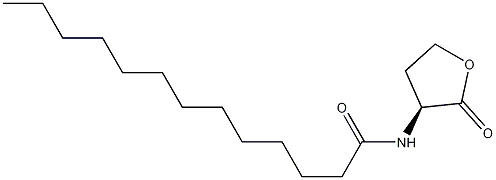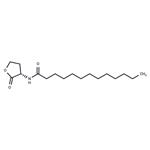Quorum sensing is a regulatory system used by bacteria for controlling gene expression in response to increasing cell density. This regulatory process manifests itself with a variety of phenotypes including biofilm formation and virulence factor production. Coordinated gene expression is achieved by the production, release, and detection of small diffusible signal molecules called autoinducers. N-TRIDECANOYL-L-HOMSERINE LACTONE comprise one such class of autoinducers, each of which generally consists of a fatty acid coupled with homoserine lactone. Regulation of bacterial quorum sensing signaling systems to inhibit pathogenesis represents a new approach to antimicrobial therapy in the treatment of infectious diseases.

